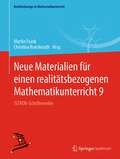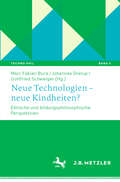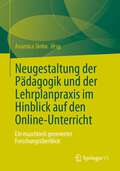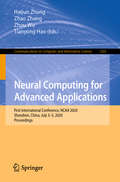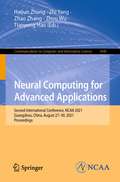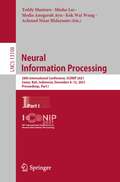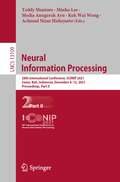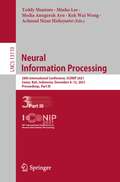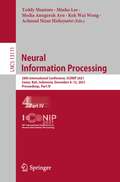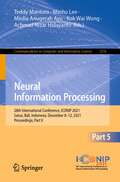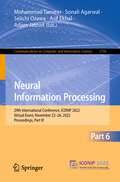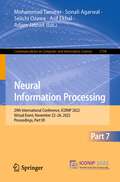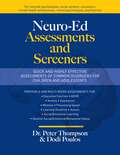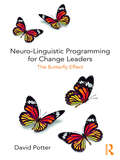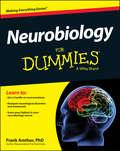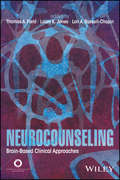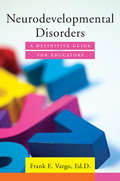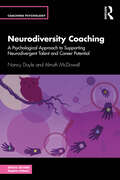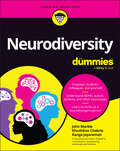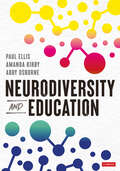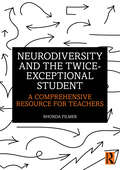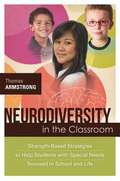- Table View
- List View
Neue Materialien für einen realitätsbezogenen Mathematikunterricht 9: ISTRON-Schriftenreihe (Realitätsbezüge im Mathematikunterricht)
by Martin Frank Christina RoeckerathErprobte Materialien mit authentischen und realen Modellierungsproblemen für den eigenen Mathematikunterricht? Dieses Buch liefert genau das. (Angehende) Lehrkräfte erhalten digitale und direkt einsetzbare Lehr- und Lernmaterialien für die Umsetzung von schülernahen Projekten zur mathematischen Modellierung. Es werden fünf Workshops zu realen Problemstellungen inklusive der zugehörigen digitalen Lernmaterialien detailliert beschrieben, die allesamt zahlreiche Anknüpfungspunkte an schulmathematische Inhalte liefern.In den fünf Workshops können die Schülerinnen und Schülerdie Bedeutung mathematischer Modellierung im Bereich Solarenergie erkunden,diskutieren und statistisch begründen, inwieweit der Klimawandel existiert,die Funktionsweise von Computertomographen erarbeiten,am Beispiel von Liedern ein eigenes Modell zur Datenkomprimierung entwickeln oder der Funktionsweise der Musikerkennungs-App Shazam auf den Grund gehen.Die Materialien der Workshops wurden bereits in verschiedenen Modellierungsveranstaltungen mit Schülerinnen und Schülern unterschiedlicher Jahrgangsstufen (ab Klasse 9) bearbeitet und kontinuierlich weiterentwickelt. Dieser Band liefert Hintergrundwissen zu allen fünf Workshops sowie didaktische Tipps für deren Umsetzung im Mathematikunterricht oder in fächerübergreifenden Projekten. Zugleich erhalten die Lehrkräfte Zugang zu dem digitalen Lernmaterial der Workshops. Dieses liegt auf einer Workshop-Plattform zum direkten Unterrichtseinsatz bereit. Lehrkräfte sowie Schülerinnen und Schüler können die Workshopmaterialien im Webbrowser bearbeiten.Die ZielgruppenMathematiklehrerinnen und -lehrer der SekundarstufenLehrende in der Fort- und Weiterbildung für Lehrkräfte (für Mathematiklehrkräfte)Studierende des Lehramts Mathematik ab dem 1. SemesterLehrende der Mathematik und ihrer Didaktik an Hochschulen
Neue Technologien – neue Kindheiten?: Ethische und bildungsphilosophische Perspektiven (Techno:Phil – Aktuelle Herausforderungen der Technikphilosophie #3)
by Johannes Drerup Gottfried Schweiger Marc Fabian BuckZu den wichtigen sozialen Einflussgrößen, die nicht nur die Konstruktion, sondern auch die Realität und Praxis institutionalisierter Kindheit(en) mitbestimmen, gehören, so der Ausgangspunkt und der Gegenstand dieses Bandes, technologische Entwicklungen und die Anwendung und Nutzung von Techniken in der Kindheit für und durch Kinder. Technische Arrangements und Praktiken sind während der Kindheit omnipräsent. In diesem Band werden systematische ethische und erziehungs-, bildungs- und kindheitsphilosophische Fragen diskutiert, die sich im Umgang mit neuen Technologien und Techniken stellen. Hierzu zählen z.B. Fragen der folgenden Art: Wie sind (Neben-)Folgen der Einführung von AI-Systemen in Unterricht und Schule zu verstehen und zu bewerten? Dürfen Eltern die Fotos ihrer Kinder auf Facebook teilen? Welche Möglichkeiten und Fallstricke bietet die Nutzung von Robotern in pädagogischen Kontexten? Welche Rolle spielen neue Technologien bei der Gestaltung des Generationenverhältnisses und für technisch vermittelte und realisierte „Regime der Kindheit“?
Neue Wege an Hochschulen: Forschungsbefunde zur Qualifikation für die Jugendarbeit
by Peter Nick Patricia PfeilIn dem vorliegenden Sammelband werden wesentliche Forschungsergebnisse aus qualitativen und quantitativen Studien eines Forschungsprojekts zu berufsbegleitendem Studieren und zu lebenslangem Lernen veröffentlicht. Zum einen geht es um den Themenkomplex der Öffnung der Hochschule für beruflich Qualifizierte. Es werden Fragen nach den Rahmenbedingungen und Hintergründen zu Zugang und Zulassung für diese Zielgruppe verhandelt. Des Weiteren werden innovative Konzepte für das akademische Lehren und Lernen vorgestellt.
Neugestaltung der Pädagogik und der Lehrplanpraxis im Hinblick auf den Online-Unterricht: Ein maschinell generierter Forschungsüberblick
by Anamica SinhaDurch den Einsatz der sich ständig weiterentwickelnden Technologie mittels eines maschinell erstellten Literaturüberblicks wird dem Bildungsforum weltweit ein prägnanter Überblick über den Einfluss der Technologie auf Pädagogik und Lehrpläne sowie über die laufenden Maßnahmen und die künftige Entwicklung gegeben.Die Pandemie hat Akademiker, Forscher, Lehrer, Schüler, Eltern und sogar die Regierung dazu gebracht, die damit verbundenen Herausforderungen zu durchdringen und zu verstehen, wie wichtig es ist, die pädagogischen Praktiken neu zu gestalten, umzustrukturieren und neu zu entwickeln. Die Einsicht in die Einbeziehung von Computeranwendungen und Informationstechnologie kann ein Vorbote einer neuen Bildungsära sein. In diesem Buch werden genau diese Aspekte und die Zukunft, auf die wir uns zubewegen, indem wir technologische Veränderungen in den Lehrplan einbauen, erörtert.
Neural Computing for Advanced Applications: First International Conference, NCAA 2020, Shenzhen, China, July 3–5, 2020, Proceedings (Communications in Computer and Information Science #1265)
by Haijun Zhang Zhao Zhang Tianyong Hao Zhou WuThis book presents refereed proceedings of the First International Conference Neural Computing for Advanced Applications, NCAA 2020, held in July, 2020. Due to the COVID-19 pandemic the conference was held online. The 36 full papers and 7 short papers were thorougly reviewed and selected from a total of 113 qualified submissions. Thes papers present resent research on such topics as neural network theory, and cognitive sciences, machine learning, data mining, data security & privacy protection, and data-driven applications, computational intelligence, nature-inspired optimizers, and their engineering applications, cloud/edge/fog computing, the Internet of Things/Vehicles (IoT/IoV), and their system optimization, control systems, network synchronization, system integration, and industrial artificial intelligence, fuzzy logic, neuro-fuzzy systems, decision making, and their applications in management sciences, computer vision, image processing, and their industrial applications, and natural language processing, machine translation, knowledge graphs, and their applications.
Neural Computing for Advanced Applications: Second International Conference, NCAA 2021, Guangzhou, China, August 27-30, 2021, Proceedings (Communications in Computer and Information Science #1449)
by Haijun Zhang Zhi Yang Zhao Zhang Tianyong Hao Zhou WuThis book presents refereed proceedings of the Second International Conference Neural Computing for Advanced Applications, NCAA 2021, held in Guangzhou, China, in August, 2021. The 54 full papers papers were thorougly reviewed and selected from a total of 144 qualified submissions. The papers are organized in topical sections on neural network theory, cognitive sciences, neuro-system hardware implementations, and NN-based engineering applications; machine learning, data mining, data security and privacy protection, and data-driven applications; neural computing-based fault diagnosis, fault forecasting, prognostic management, and system modeling; computational intelligence, nature-inspired optimizers, and their engineering applications; fuzzy logic, neuro-fuzzy systems, decision making, and their applications in management sciences; control systems, network synchronization, system integration, and industrial artificial intelligence; computer vision, image processing, and their industrial applications; cloud/edge/fog computing, the Internet of Things/Vehicles(IoT/IoV), and their system optimization; spreading dynamics, forecasting, and other intelligent techniques against coronavirus disease (COVID-19).
Neural Information Processing: 28th International Conference, ICONIP 2021, Sanur, Bali, Indonesia, December 8–12, 2021, Proceedings, Part I (Lecture Notes in Computer Science #13108)
by Minho Lee Kok Wai Wong Teddy Mantoro Media Anugerah Ayu Achmad Nizar HidayantoThe four-volume proceedings LNCS 13108, 13109, 13110, and 13111 constitutes the proceedings of the 28th International Conference on Neural Information Processing, ICONIP 2021, which was held during December 8-12, 2021. The conference was planned to take place in Bali, Indonesia but changed to an online format due to the COVID-19 pandemic. The total of 226 full papers presented in these proceedings was carefully reviewed and selected from 1093 submissions. The papers were organized in topical sections as follows: Part I: Theory and algorithms; Part II: Theory and algorithms; human centred computing; AI and cybersecurity; Part III: Cognitive neurosciences; reliable, robust, and secure machine learning algorithms; theory and applications of natural computing paradigms; advances in deep and shallow machine learning algorithms for biomedical data and imaging; applications; Part IV: Applications.
Neural Information Processing: 28th International Conference, ICONIP 2021, Sanur, Bali, Indonesia, December 8–12, 2021, Proceedings, Part II (Lecture Notes in Computer Science #13109)
by Minho Lee Kok Wai Wong Teddy Mantoro Media Anugerah Ayu Achmad Nizar HidayantoThe four-volume proceedings LNCS 13108, 13109, 13110, and 13111 constitutes the proceedings of the 28th International Conference on Neural Information Processing, ICONIP 2021, which was held during December 8-12, 2021. The conference was planned to take place in Bali, Indonesia but changed to an online format due to the COVID-19 pandemic. The total of 226 full papers presented in these proceedings was carefully reviewed and selected from 1093 submissions. The papers were organized in topical sections as follows: Part I: Theory and algorithms; Part II: Theory and algorithms; human centred computing; AI and cybersecurity; Part III: Cognitive neurosciences; reliable, robust, and secure machine learning algorithms; theory and applications of natural computing paradigms; advances in deep and shallow machine learning algorithms for biomedical data and imaging; applications; Part IV: Applications.
Neural Information Processing: 28th International Conference, ICONIP 2021, Sanur, Bali, Indonesia, December 8–12, 2021, Proceedings, Part III (Lecture Notes in Computer Science #13110)
by Minho Lee Kok Wai Wong Teddy Mantoro Media Anugerah Ayu Achmad Nizar HidayantoThe four-volume proceedings LNCS 13108, 13109, 13110, and 13111 constitutes the proceedings of the 28th International Conference on Neural Information Processing, ICONIP 2021, which was held during December 8-12, 2021. The conference was planned to take place in Bali, Indonesia but changed to an online format due to the COVID-19 pandemic. The total of 226 full papers presented in these proceedings was carefully reviewed and selected from 1093 submissions. The papers were organized in topical sections as follows: Part I: Theory and algorithms; Part II: Theory and algorithms; human centred computing; AI and cybersecurity; Part III: Cognitive neurosciences; reliable, robust, and secure machine learning algorithms; theory and applications of natural computing paradigms; advances in deep and shallow machine learning algorithms for biomedical data and imaging; applications; Part IV: Applications.
Neural Information Processing: 28th International Conference, ICONIP 2021, Sanur, Bali, Indonesia, December 8–12, 2021, Proceedings, Part IV (Lecture Notes in Computer Science #13111)
by Minho Lee Kok Wai Wong Teddy Mantoro Media Anugerah Ayu Achmad Nizar HidayantoThe four-volume proceedings LNCS 13108, 13109, 13110, and 13111 constitutes the proceedings of the 28th International Conference on Neural Information Processing, ICONIP 2021, which was held during December 8-12, 2021. The conference was planned to take place in Bali, Indonesia but changed to an online format due to the COVID-19 pandemic. The total of 226 full papers presented in these proceedings was carefully reviewed and selected from 1093 submissions. The papers were organized in topical sections as follows: Part I: Theory and algorithms; Part II: Theory and algorithms; human centred computing; AI and cybersecurity; Part III: Cognitive neurosciences; reliable, robust, and secure machine learning algorithms; theory and applications of natural computing paradigms; advances in deep and shallow machine learning algorithms for biomedical data and imaging; applications; Part IV: Applications.
Neural Information Processing: 28th International Conference, ICONIP 2021, Sanur, Bali, Indonesia, December 8–12, 2021, Proceedings, Part V (Communications in Computer and Information Science #1516)
by Minho Lee Kok Wai Wong Teddy Mantoro Media Anugerah Ayu Achmad Nizar HidayantoThe two-volume set CCIS 1516 and 1517 constitutes thoroughly refereed short papers presented at the 28th International Conference on Neural Information Processing, ICONIP 2021, held in Sanur, Bali, Indonesia, in December 2021.* The volume also presents papers from the workshop on Artificial Intelligence and Cyber Security, held during the ICONIP 2021. The 176 short and workshop papers presented in this volume were carefully reviewed and selected for publication out of 1093 submissions. The papers are organized in topical sections as follows: theory and algorithms; AI and cybersecurity; cognitive neurosciences; human centred computing; advances in deep and shallow machine learning algorithms for biomedical data and imaging; reliable, robust, and secure machine learning algorithms; theory and applications of natural computing paradigms; applications.* The conference was held virtually due to the COVID-19 pandemic.
Neural Information Processing: 29th International Conference, ICONIP 2022, Virtual Event, November 22–26, 2022, Proceedings, Part VI (Communications in Computer and Information Science #1793)
by Seiichi Ozawa Adam Jatowt Sonali Agarwal Mohammad Tanveer Asif EkbalThe four-volume set CCIS 1791, 1792, 1793 and 1794 constitutes the refereed proceedings of the 29th International Conference on Neural Information Processing, ICONIP 2022, held as a virtual event, November 22–26, 2022. The 213 papers presented in the proceedings set were carefully reviewed and selected from 810 submissions. They were organized in topical sections as follows: Theory and Algorithms; Cognitive Neurosciences; Human Centered Computing; and Applications.The ICONIP conference aims to provide a leading international forum for researchers, scientists, and industry professionals who are working in neuroscience, neural networks, deep learning, and related fields to share their new ideas, progress, and achievements.
Neural Information Processing: 29th International Conference, ICONIP 2022, Virtual Event, November 22–26, 2022, Proceedings, Part VII (Communications in Computer and Information Science #1794)
by Seiichi Ozawa Adam Jatowt Sonali Agarwal Mohammad Tanveer Asif EkbalThe four-volume set CCIS 1791, 1792, 1793 and 1794 constitutes the refereed proceedings of the 29th International Conference on Neural Information Processing, ICONIP 2022, held as a virtual event, November 22–26, 2022. The 213 papers presented in the proceedings set were carefully reviewed and selected from 810 submissions. They were organized in topical sections as follows: Theory and Algorithms; Cognitive Neurosciences; Human Centered Computing; and Applications.The ICONIP conference aims to provide a leading international forum for researchers, scientists, and industry professionals who are working in neuroscience, neural networks, deep learning, and related fields to share their new ideas, progress, and achievements.
Neuro-Ed Assessments and Screeners: Quick and Highly Effective Assessments of Common Disorders for Children and Adolescents
by Peter Thompson Dodi PoulosNeuro-Ed Assessment and Screeners are fast and effective assessment forms for busy mental health and educational professionals. These practical assessments were created by practitioners who know the needs of professionals working in the field. Th
Neuro-Linguistic Programming for Change Leaders: The Butterfly Effect
by David PotterWe know a lot about change leadership. We understand how to design change programmes, and we know how to prescribe best practice change methods. Yet, despite all this knowledge, it is reported that up to 70% of change leadership projects fail to realize many of their objectives. The fault lines are cited as occurring at the micro level of social interaction. What we don’t adequately explain and demonstrate within the change leadership literature is how change leaders may consciously generate in themselves and in others resourceful mindsets, emotions, attitudes, and behaviours to enable positive change leadership dynamics. Neuro-Linguistic Programming for Change Leaders: The Butterfly Effect fills this gap by connecting the practices of personal development with those of corporate change leadership. This book has the vision of advancing NLP as a serious technology in the change leader’s tool box. The book introduces to operations managers, HR practitioners, OD specialists, and students of management new ideas and practices, which can transform their effectiveness as change leaders. It focuses on the benefits of applied NLP to change leaders as a generative change toolkit. Secondly, the book provides a model that shows change leaders how to build a climate of psychological safety to establish rapport with stakeholders. Thirdly, the book provides a strategy for enabling broader cultural change and stakeholder engagement throughout the organization.
Neurobiology For Dummies
by Frank AmthorThe approachable, comprehensive guide to neurobiology Neurobiology rolls the anatomy, physiology, and pathology of the nervous system into one complex area of study. Neurobiology For Dummies breaks down the specifics of the topic in a fun, easy-to-understand manner. The book is perfect for students in a variety of scientific fields ranging from neuroscience and biology to pharmacology, health science, and more. With a complete overview of the molecular and cellular mechanisms of the nervous system, this complete resource makes short work of the ins and outs of neurobiology so you can understand the details quickly. Dive into this fascinating guide to an even more fascinating subject, which takes a step-by-step approach that naturally builds an understanding of how the nervous system ties into the very essence of human beings, and what that means for those working and studying in the field of neuroscience. The book includes a complete introduction to the subject of neurobiology. Gives you an overview of the human nervous system, along with a discussion of how it's similar to that of other animals Discusses various neurological disorders, such as strokes, Alzheimer's disease, Parkinson's disease, and schizophrenia Leads you through a point-by-point approach to describe the science of perception, including how we think, learn, and remember Neurobiology For Dummies is your key to mastering this complex topic, and will propel you to a greater understanding that can form the basis of your academic and career success.
Neurocounseling: Brain-Based Clinical Approaches
by Lori A. Russell-Chapin Thomas A. Field Laura K. JonesThis text presents current, accessible information on enhancing the counseling process using a brain-based paradigm. Leading experts provide guidelines and insights for becoming a skillful neuroscience-informed counselor, making direct connections between the material covered and clinical practice. In this much-needed resource—the first to address neurocounseling concepts across the counseling curriculum—chapters cover each of the eight common core areas in the 2016 CACREP Standards in addition to several specialty areas of the Standards. Detailed case studies, questions for reflection, quiz questions, and a glossary facilitate classroom use. *Requests for digital versions from the ACA can be found on wiley.com. *To request print copies, please visit the ACA website here. *Reproduction requests for material from books published by ACA should be directed to permissions@counseling.org
Neurodevelopmental Disorders: A Definitive Guide for Educators
by Frank E. VargoFrom autism to ADHD to learning disabilities, a guide for all teachers to this constellation of disorders. Developmental deficits in learning and communication in young children are defined as neurodevelopmental disorders. This constellation, newly defined in the DSM-5, represents a range of issues that educators must address. Neurodevelopmental Disorders: A Definitive Guide for Educators provides extensive and practical information to a range of professionals, and to all others who are interested in the complex and often misunderstood disabilities that fall within the general medical and psychological diagnostic categories of neurodevelopmental disability. Noted psychologist and educator Dr. Frank E. Vargo provides a comprehensive overview of neurodevelopmental deficits and disabilities, as well as of their related learning and cognitive processes, with a strong focus on educational considerations, applications, and relevance across academic areas and with a mind to global educational models. Well researched and accessibly written, this book is an up-to-date and authoritative reference to all of the educational and clinical topics in the diagnostic categories of neurodevelopmental disorder. This informative book will provide a primary reference source for all educators, school and clinical psychologists, clinical mental health counselors and therapists, special education and medical professionals, and parents of children with special needs.
Neurodiversity Coaching: A Psychological Approach to Supporting Neurodivergent Talent and Career Potential (Coaching Psychology)
by Almuth McDowall Nancy Doyle- neurodiversity coaching is an emerging field, the topic of neurodiversity has been increasing in the past decade and general awareness is growing - this book will be the first, broad publication on neurodiversity coaching - uses science-based methodology
Neurodiversity Coaching: A Psychological Approach to Supporting Neurodivergent Talent and Career Potential (Coaching Psychology)
by Almuth Mcdowall Nancy DoyleNeurodiversity Coaching demystifies the themes and assumptions affecting neurodivergent coachee experiences at work, whilst at the same time exploring the necessary safeguards required for working with this vulnerable group. The book supports existing coaching practitioners, managers and community leaders to understand the essentials of neurodivergence, a term which encompasses ADHD, autism, dyslexia, dyspraxia and Tourette Syndrome, and how these diagnoses require specific coaching approaches to support individuals to thrive at work. This book is practically focused on the “how”, sharing coaching exercises and activities that have been evaluated and researched by authors with extensive experience in the field. Grounded in coaching psychology theory, those with existing knowledge will be able to transfer their skill set to the neurodiversity context and those who are considering learning more about coaching can be signposted to essential knowledge and skills. Neurodiversity Coaching will be suitable for independent coaching practitioners and internal organisational coaches and managers seeking a coaching approach.
Neurodiversity For Dummies
by John Marble Khushboo Chabria Ranga JayaramanA quick and easy way to understand neurodiversity as written by neurodivergent people and our families Neurodiversity For Dummies is your essential guide in understanding neurodivergent conditions like autism, ADHD, dyslexia, and more. This quick and easy guide is perfect for anyone needing to know more about neurodiversity. And that’s all of us—because recent estimates say that 15-20% of the world’s population have some form of neurodivergence. Your life is filled with neurodivergent people that you know and love, whether you realize it yet or not. It’s time to learn to support and include the neurodivergent among us, and to understand how neurodiversity impacts society and the workplace. This is for the neurodivergent person wanting to thrive in life, for parents and caregivers seeking success for their child, and for teachers who are working to make a difference in their students’ lives. Filled with practical advice, Neurodiversity for Dummies also provides a helping hand to service providers, assistance for workplace managers and colleagues, and understanding for family members and friends. Imagine a world where we all understood ourselves better and appreciated more deeply the differences in others. No matter how your own brain thinks, Neurodiversity for Dummies is for you. Check out this jargon-free introduction for an essential overview. Explore the Spectrum of Neurodiversity: Understand in plain language the world of autism, ADHD, dyslexia, and other neurodivergent conditions. Unlock Hidden Talents: Move yourself beyond common myths and misconceptions to discover how neurodiversity actually works. Learn how neurodiversity has always been with us, why society needs neurodivergent traits, and how neurodiversity can be a wellspring of innovation, creativity, and out-of-the-box thinking. Discover Yourself: Whether you are a neurodivergent person or not, learn how to understand your own normalcy, advocate for your needs, and build meaningful connections with those who think and experience the world differently than you. Change the World Around You: Be empowered through simple steps you can take to create inclusive environments for neurodivergent individuals in your school or workplace. Uncover proven strategies that cultivate a culture of acceptance and respect, where the unique perspectives of all individuals are valued and celebrated. We believe in providing parents with better supports, empowering individuals with information, and shaping a world where we are all seen and understood. With an author team composed of neurodivergent individuals and parents writing together, Neurodiversity for Dummies is an example of the power of neurodiversity when put into action. It’s why we wrote this for you. Don’t miss your chance to embark on this transformative journey. Order your copy of Neurodiversity for Dummies now to better understand yourself and others, and to join the movement that is revolutionizing how we understand and support the diversity of the human mind.
Neurodiversity and Education
by Amanda Kirby Paul Ellis Abby OsborneHuman brains are diverse: each one of us has a unique set of connections between billions of nerve cells. Neurodiversity is about us all. It is not an exclusive club or one condition, difficulty, difference, or disorder. Understanding more about the concept of neurodiversity helps us consider, respect and appreciate these differences. It helps us see potential rather than deficit. This clear and practical book, which is useful for all apsects of learning and education discusses how an emphasis on neurodiverse ′ability′ can cultivate a better world.
Neurodiversity and Education
by Amanda Kirby Paul Ellis Abby OsborneHuman brains are diverse: each one of us has a unique set of connections between billions of nerve cells. Neurodiversity is about us all. It is not an exclusive club or one condition, difficulty, difference, or disorder. Understanding more about the concept of neurodiversity helps us consider, respect and appreciate these differences. It helps us see potential rather than deficit. This clear and practical book, which is useful for all apsects of learning and education discusses how an emphasis on neurodiverse ′ability′ can cultivate a better world.
Neurodiversity and the Twice-Exceptional Student: A Comprehensive Resource for Teachers
by Rhonda FilmerWritten for busy teachers, this practical manual defines terms, shares examples and provides evidence-based information and strategies to support the teaching of twice-exceptional students. Providing a comprehensive blueprint in an easy-to-use format, this book explains classroom techniques for differentiation with tips and advice based on research and teacher experience. The topics covered include learning disabilities, gifted and high potential education, talent development and general classroom pedagogy involving curriculum differentiation and individualised programming. It also explains, in more depth, the varying presentations of neurodiversity in the form of specific learning disabilities, autism and attention deficits in the gifted/high potential student to enable teachers to acquire more knowledge of the nuances evident in each twice-exceptional student. Case studies capture the perspectives of twice-exceptional young people who have thrived, and the book provides weblinks to a very comprehensive list of helpful, freely-available resources.This essential, practical resource will serve teachers and educators in both primary and secondary schooling, as well as pre-service educators. It will also be of interest to parents and carers.
Neurodiversity in the Classroom: Strength-Based Strategies to Help Students with Special Needs Succeed in School and Life
by Thomas ArmstrongA new concept on human diversity has emerged over the past 10 years that promises to revolutionize the way educators provide services to students with special needs: neurodiversity. Just as we celebrate diversity in nature and cultures, so too do we need to honor the diversity of brains among our students who learn, think, and behave differently. In Neurodiversity in the Classroom, best-selling author Thomas Armstrong argues that we should embrace the strengths of such neurodiverse students to help them and their neurotypical peers thrive in school and beyond. This innovative book focuses on five categories of special needs: learning disabilities, attention deficit hyperactivity disorder, autism, intellectual disabilities, and emotional and behavioral disorders.
